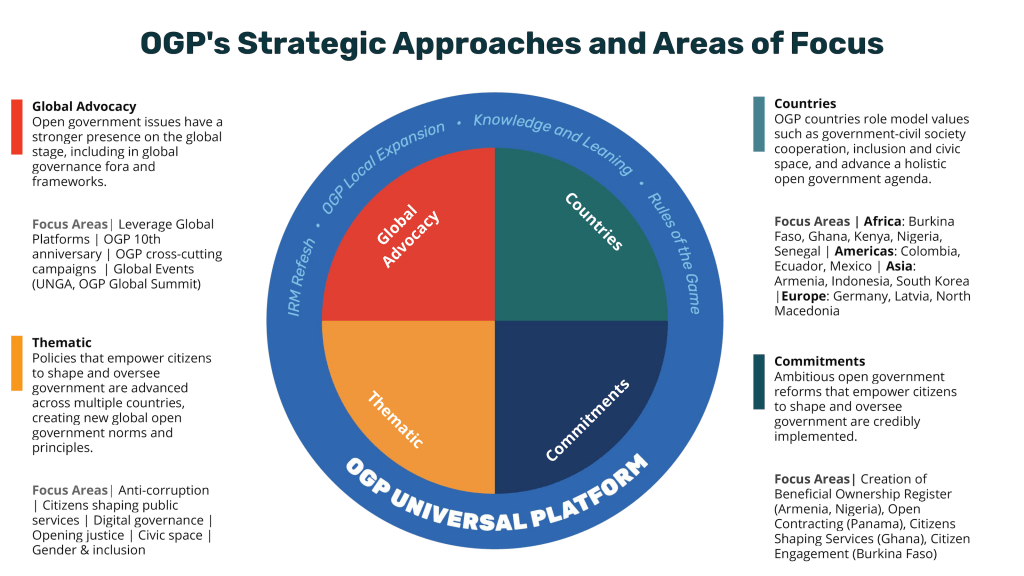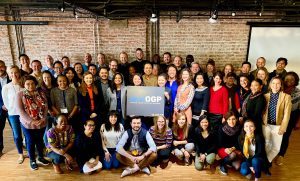Launching OGP’s 2020-22 Plan in a Time of Crisis
Lanzamiento de plan de OGP 2020-22 en tiempos de crisis
Less than a month ago in Berlin, the OGP Steering Committee met and approved a new three-year implementation plan for the Partnership. This plan has gone through multiple iterations since we started the planning process over the past six months and was strengthened greatly by feedback and suggestions from the open government community worldwide. I encourage you to read the final plan and our summary of how we took into account feedback received.
Overall, our aim is to improve the services OGP provides to all of its members, including through a revamped Independent Reporting Mechanism (IRM)The Independent Reporting Mechanism (IRM) is OGP’s accountability arm and the main means of tracking progress in participating countries. The IRM provides independent, evidence-based, and objective ..., an expanded OGP Local strategy, and a stronger knowledge and learning hub. The plan also points to focus countries, reforms, policy areas, and global advocacy strategies where OGP will invest disproportionate time, energyEnsuring universal access to sustainable, dependable, and affordable energy is critical to every aspect of prosperity. Increasing public oversight and transparency in the energy sector can help to ens... More, and resources in order to help demonstrate the value the Partnership can bring (see graphic below).
Of course, since late February, the worldwide coronavirus pandemic has taken hold. Our attention was immediately on ensuring the safety and well-being of our own staff, and bringing in flexibility for OGP members around their participation in coming months, especially on expectations for in person government – civil society dialogue. The work of open government is as important as ever, but we know it will look and feel different in the coming months, and that there are major long-term implications for our societies.
“Everyone has a plan until they get punched in the mouth” said heavyweight boxing champion Mike Tyson. In this case, we had not even publicly launched our new plan before we have had to rapidly think through how to revise it due to our new context. Our intention was always to continually look to adapt and iterate based on new opportunities and learning. For example, in the plan we highlight 14 focus countries where we feel the political conditions, civil society interest and moment in the OGP cycle make for an opportunity to make significant progress, and for the OGP Support UnitThe OGP Support Unit is a small, permanent group of staff that work closely with the Steering Committee and the Independent Reporting Mechanism to advance the goals of the Open Government Partnership...., Steering CommitteeThe Steering Committee is OGP’s executive decision-making body. Its role is to develop, promote and safeguard OGP’s values, principles and interests; establish OGP’s core ideas, policies, and ru... and strategic partners to intensely focus their efforts. Those 14 focus countries make sense now, but electionsImproving transparency in elections and maintaining the independence of electoral commissions is vital for promoting trust in the electoral system, preventing electoral fraud, and upholding the democr... More and other changes in context will inevitably mean that by this time next year, there will be new countries where it makes sense to focus, and some on the current list will not need such intensive support. This is what we hope will be agile, data-driven and adaptive management in practice, precisely the type of approach many governments and civil society organizations involved in OGP use to great effect.
The OGP Support Unit is now undertaking an exercise to look across all of our 2020 activities and see what needs to be adjusted, axed or added in light of the pandemic. We have already started collating examples of open government approaches to help fight the coronavirus, and keeping a watchful eye of where our values may be under threat from responses to the crisis. It is at moments like this that the vision and mission of OGP is as relevant and urgent as ever, and can make a real difference in the lives of citizens. We are hugely excited by the potential for OGP to become a stronger force for open government and democracy, anchored in an inspiring community of reformers who are right now working harder than ever to ensure open, transparent, accountable and participatory governance is the model for the future.

Explore the strategic approaches and areas of focus for OGP’s 2020-2022 Implementation Plan.
Hace menos de un mes, el Comité Directivo de OGP se reunió en Berlín. En esta reunión, se aprobó el nuevo plan de implementación a 3 años. Desde que iniciamos el proceso de planeación hace seis meses, el plan ha pasado por varias iteraciones y se ha fortalecido de forma importante gracias a la retroalimentación y las recomendaciones que nos enviaron los miembros de la comunidad global de gobierno abierto. Los invito a leer la versión final del plan y el resumen en el que explicamos cómo incorporamos la retroalimentación que recibimos.
Nuestro objetivo final es mejorar los servicios que OGP ofrece a sus miembros, entro otros, los del Mecanismo de Revisión Independiente recientemente renovado, el Programa OGP Local en expansión y un centro de aprendizaje y conocimiento fortalecido. Además, el plan identifica países, reformas, áreas de política y estrategias incidencia en las que se enfocará e invertirá la mayor cantidad de tiempo, energía y recursos con el fin de demostrar el valor de la alianza (ver figura).
Desde finales de febrero, cuando la pandemia global de coronavirus se presentó, nuestra atención se volcó de inmediato en asegurar la seguridad y el bienestar de nuestro equipo y en dar flexibilidad a los miembros de OGP alrededor de su participación en OGP para los siguientes meses, en particular en lo que respecta a los diálogos entre el gobierno y la sociedad civil. El trabajo de gobierno sigue siendo de gran importancia, pero sabemos que en los próximos meses se realizará de formas diferentes y que habrá implicaciones importantes y de largo plazo para nuestras sociedades.
“Todo mundo tiene un plan hasta que lo golpean en la boca”, comentó el campeón de boxeo Mike Tyson. En este caso, no habíamos publicado nuestro plan cuando tuvimos que adaptarlo a un nuevo contexto. Nuestra intención siempre fue poder modificarlo en función de nuevas oportunidades y lecciones aprendidas. Por ejemplo, en el plan resaltamos 14 países en los que, debido a las condiciones políticas, el interés de la sociedad civil y el momento en el que se encuentra el ciclo de OGP, existe la oportunidad de lograr avances significativos, por lo que la Unidad de Apoyo, el Comité Directivo y socios estratégicos enfocarían sus esfuerzos en ellos. En este momento, esta selección de 14 países tiene sentido, pero después de las elecciones y de otros cambios que ocurrirán el próximo año, habrá otros países en los que nos deberemos enfocarnos y algunos de la lista actual podrían necesitar menos apoyo. Por ello, esperamos poder implementar un enfoque ágil, basado en datos y de manejo adaptativo, justamente el tipo de enfoque que muchos gobiernos y organizaciones de la sociedad civil que participan en OGP utilizan en gran medida.
La Unidad de Apoyo de OGP está revisando todas nuestras actividades y analizando qué debemos ajustar, eliminar o incorporar, considerando este nuevo contexto de la pandemia. Ya estamos viendo algunos ejemplos de prácticas de gobierno abierto que se están aplicando para luchar contra el coronavirus y estaremos atentos para identificar casos en los que nuestros valores podrían estar amenazados por la crisis. En momentos como este, la misión y visión de OGP son más relevantes y urgentes que nunca y pueden hacer una diferencia real en la vida de las personas. Estamos muy emocionados por el potencial que tiene OGP de ser una fuerza para el gobierno abierto y la democracia, anclado en una gran comunidad de reformadores que están trabajando más que nunca para asegurar que la gobernanza abierta, transparente y participativa sea el modelo para el futuro.

Explore the strategic approaches and areas of focus for OGP’s 2020-2022 Implementation Plan.


Ezekiel Makhene Reply
Open Government Partnership (OGP) is a highly commendable initiative which will solve the critical problem of corruption coupled with exploitation of communities.
Special reference is made in particular to municipalities which play a crucial role in the economy of any country, for example, they are creators of an enabling environment for the establishment and development of businesses, particularly small, medium and micro enterprises (SMMEs), while the latter are the job creating engine in the economy.
There is therefore a very close economic relationship between municipalities and SMMEs.
I’ve depicted this relationship and concluded that municipalities and SMMEs are economic partners which I call: Municipality-SMME Partnership in the economy.
It is crucial to note that I’ve included the informal sector because informal sector employment is more potent in reducing poverty than formal sector employment.